GENERALSOLUTIONS 101
Greetings! in this page you will get access with education resources practice questions with answers and study materials modified to empower and enhance your knowledge, I will be sharing all materials, study guides, tests, Q&As, test banks, Hesi questions, etc. on my page for . Best of luck to you all! Happy studying!
- 263
- 0
- 1
Community
- Followers
- Following
264 items
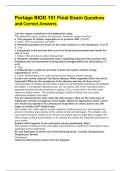
Portage BIOD 151 Final Exam Questions anPortage BIOD 151 Final Exam Questions and Correct Answers.d Correct Answers.
List two organs contained in the abdominal cavity. The abdominal cavity contains the stomach, intestines, spleen and liver a. The purpose of cellular respiration is to produce ADP. (T or F) a. False- (ATP is produced, not ADP) b. Peripheral proteins are found on the outer surface of a cell membrane. (T or F) b. True c. Exocytosis is the process that occurs to bring biomacromolecules inside the cell. (T or F) c. False- (This process is called endocytosis) d. Receptor mediated endocytosis ...
- Package deal
- Exam (elaborations)
- • 3 pages •
List two organs contained in the abdominal cavity. The abdominal cavity contains the stomach, intestines, spleen and liver a. The purpose of cellular respiration is to produce ADP. (T or F) a. False- (ATP is produced, not ADP) b. Peripheral proteins are found on the outer surface of a cell membrane. (T or F) b. True c. Exocytosis is the process that occurs to bring biomacromolecules inside the cell. (T or F) c. False- (This process is called endocytosis) d. Receptor mediated endocytosis ...
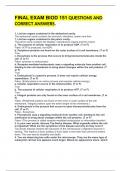
FINAL EXAM BIOD 151 QUESTIONS AND CORRECT ANSWERS.
1. List two organs contained in the abdominal cavity. The abdominal cavity contains the stomach, intestines, spleen and liver 1. List two organs contained in the pelvic cavity. The pelvic cavity contains the bladder, reproductive organs and the rectum a. The purpose of cellular respiration is to produce ADP. (T or F) False- (ATP is produced, not ADP) b. Peripheral proteins are found on the outer surface of a cell membrane. (T or F) True c. Exocytosis is the process that occurs to bring b...
- Package deal
- Exam (elaborations)
- • 6 pages •
1. List two organs contained in the abdominal cavity. The abdominal cavity contains the stomach, intestines, spleen and liver 1. List two organs contained in the pelvic cavity. The pelvic cavity contains the bladder, reproductive organs and the rectum a. The purpose of cellular respiration is to produce ADP. (T or F) False- (ATP is produced, not ADP) b. Peripheral proteins are found on the outer surface of a cell membrane. (T or F) True c. Exocytosis is the process that occurs to bring b...
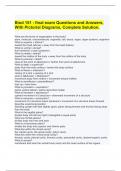
Biod 151 - final exam Questions and Answers, With Pictorial Diagrams, Complete Solution.
What are the levels of organization in the body? atom, molecule, macromolecule, organelle, cell, tissue, organ, organ systems, organism What is superior v inferior? toward the head (above) v away from the head (below) What is ventral v dorsal? front (anterior) v back (posterior) What is medial v lateral? toward the midline of the body v away from the midline of the body What is proximal v distal? close to the point of attachment v farther from point of attachment What is deep v superfi...
- Exam (elaborations)
- • 12 pages •
What are the levels of organization in the body? atom, molecule, macromolecule, organelle, cell, tissue, organ, organ systems, organism What is superior v inferior? toward the head (above) v away from the head (below) What is ventral v dorsal? front (anterior) v back (posterior) What is medial v lateral? toward the midline of the body v away from the midline of the body What is proximal v distal? close to the point of attachment v farther from point of attachment What is deep v superfi...
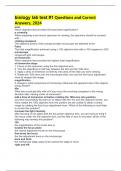
BIOD 151 biology lab test #1 Questions and Correct Answers, 2024
Answers, 2024 scan Which objective lens provides the least total magnification? a coverslip When preparing a wet mount specimen for viewing, the specimen should be covered with... rotating nosepiece The objective lenses of the compound light microscope are attached to the False The total magnification achieved using a 10X objective lens with a 10X eyepiece is 20X. microscope compound light microscope oil immersion Which objective lens provides the highest total magnification oil imm...
- Exam (elaborations)
- • 7 pages •
Answers, 2024 scan Which objective lens provides the least total magnification? a coverslip When preparing a wet mount specimen for viewing, the specimen should be covered with... rotating nosepiece The objective lenses of the compound light microscope are attached to the False The total magnification achieved using a 10X objective lens with a 10X eyepiece is 20X. microscope compound light microscope oil immersion Which objective lens provides the highest total magnification oil imm...
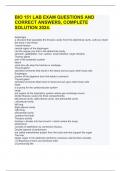
BIO 151 LAB EXAM QUESTIONS AND CORRECT ANSWERS, COMPLETE SOLUTION 2024.
diaphragm a structure that separates the thoracic cavity from the abdominal cavity, until you reach the hairs in the throat Central tendon central region of the diaphragm List the orgnas you find in the abdominal cavity stomach, gallbladder, liver, spleen, small intestine, large intestine Thymus gland part of the lymphatic system larynx voice box sits atop the trachea or windpipe. Thyroid gland secretes hormones that travel in the blood and act upon other body cells Esophagus protio...
- Exam (elaborations)
- • 13 pages •
diaphragm a structure that separates the thoracic cavity from the abdominal cavity, until you reach the hairs in the throat Central tendon central region of the diaphragm List the orgnas you find in the abdominal cavity stomach, gallbladder, liver, spleen, small intestine, large intestine Thymus gland part of the lymphatic system larynx voice box sits atop the trachea or windpipe. Thyroid gland secretes hormones that travel in the blood and act upon other body cells Esophagus protio...
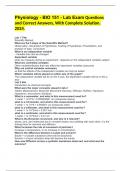
Physiology - BIO 151 - Lab Exam Questions and Correct Answers, With Complete Solution. 2024.
Lab 1 Title Scientific Method What are the 5 steps of the Scientific Method? Observation, Generation of Hypothesis, Testing of Hypothesis, Presentation, and analysis of data, Conclusion What is an independent variable - Variable that cant be changed dependent variable what you measure during an experiment - depends on the independent variable/ subject What are controlled variables Other variables/factors that may affect the dependent variables (outcome) Why are control variables necess...
- Exam (elaborations)
- • 16 pages •
Lab 1 Title Scientific Method What are the 5 steps of the Scientific Method? Observation, Generation of Hypothesis, Testing of Hypothesis, Presentation, and analysis of data, Conclusion What is an independent variable - Variable that cant be changed dependent variable what you measure during an experiment - depends on the independent variable/ subject What are controlled variables Other variables/factors that may affect the dependent variables (outcome) Why are control variables necess...
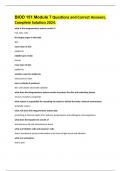
BIOD 151 Module 7 Questions and Correct Answers, Complete Solution 2024.
Complete Solution 2024. what is the integumentary system consist of hair, skin, nails the largest organ in the body skin outer layer of skin epidermis middle layer of skin dermis inner layer of skin epidermis another name for epidermis subcutaneous layer how is vitamin D produced skin cells absorb ultraviolet radiation what does the integumentary system contain to protect the skin and underlying tissues sensory receptors and glands what system is responsible for mounting the att...
- Exam (elaborations)
- • 5 pages •
Complete Solution 2024. what is the integumentary system consist of hair, skin, nails the largest organ in the body skin outer layer of skin epidermis middle layer of skin dermis inner layer of skin epidermis another name for epidermis subcutaneous layer how is vitamin D produced skin cells absorb ultraviolet radiation what does the integumentary system contain to protect the skin and underlying tissues sensory receptors and glands what system is responsible for mounting the att...
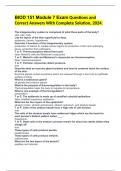
BIOD 151 Module 7 Exam Questions and Correct Answers With Complete Solution, 2024.
The integumentary system is comprised of what three parts of the body? skin, hair, nails List the layers of the skin superficial to deep. epidermis, dermis, hypodermis Describe 3 functions of the integumentary system. production of vitamin D, contain sense organs for protection of skin and underlying tissue, protection from pathogens T or F: Thermoreceptors detect fine touch. false; Merkel's cells and Meissner's corpuscles T or F: Merkel's cells and Meissner's corpuscles are thermore...
- Exam (elaborations)
- • 4 pages •
The integumentary system is comprised of what three parts of the body? skin, hair, nails List the layers of the skin superficial to deep. epidermis, dermis, hypodermis Describe 3 functions of the integumentary system. production of vitamin D, contain sense organs for protection of skin and underlying tissue, protection from pathogens T or F: Thermoreceptors detect fine touch. false; Merkel's cells and Meissner's corpuscles T or F: Merkel's cells and Meissner's corpuscles are thermore...
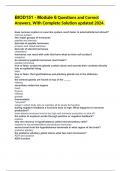
BIOD151 - Module 6 Questions and Correct Answers, With Complete Solution updated 2024.
does nervous system or exocrine system react faster to external/internal stimuli? nervous system two major groups of hormones peptide and steroids derivate of peptide hormones proteins and catecholamines derivate of steroid hormones cholesterol hormones can react with cells that have what on their cell surface? receptors do steroid or peptide hormones react faster? peptide hormones true or false: endocrine glands contain ducts and secrete their contents directly into an epithelial li...
- Exam (elaborations)
- • 9 pages •
does nervous system or exocrine system react faster to external/internal stimuli? nervous system two major groups of hormones peptide and steroids derivate of peptide hormones proteins and catecholamines derivate of steroid hormones cholesterol hormones can react with cells that have what on their cell surface? receptors do steroid or peptide hormones react faster? peptide hormones true or false: endocrine glands contain ducts and secrete their contents directly into an epithelial li...
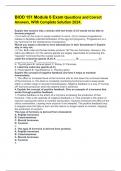
BIOD 151 Module 6 Exam Questions and Correct Answers, With Complete Solution 2024.
Erythropoietin, anemia 25. If you were calcium deficient, which condition would occur in your body if there was no hormonal compensation? Anemia Tetany Acromegaly Jet lag Tetany 25. If you were calcium deficient, which hormone would most likely need to increase in your body in order to compensate? A. PTH B. Calcitonin C. Erythropietin D. TSH A 26. Which of the following is true regarding estrogen? Production is highest in childhood. It causes growth of the uterus and vagina. It d...
- Exam (elaborations)
- • 7 pages •
Erythropoietin, anemia 25. If you were calcium deficient, which condition would occur in your body if there was no hormonal compensation? Anemia Tetany Acromegaly Jet lag Tetany 25. If you were calcium deficient, which hormone would most likely need to increase in your body in order to compensate? A. PTH B. Calcitonin C. Erythropietin D. TSH A 26. Which of the following is true regarding estrogen? Production is highest in childhood. It causes growth of the uterus and vagina. It d...
